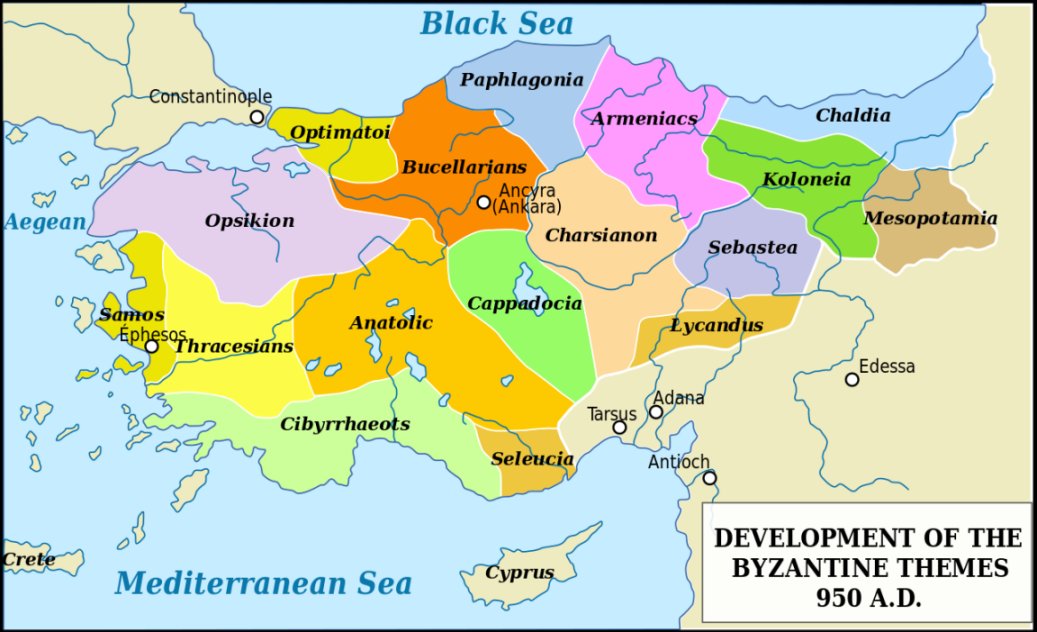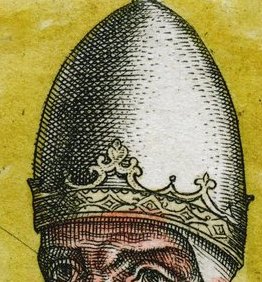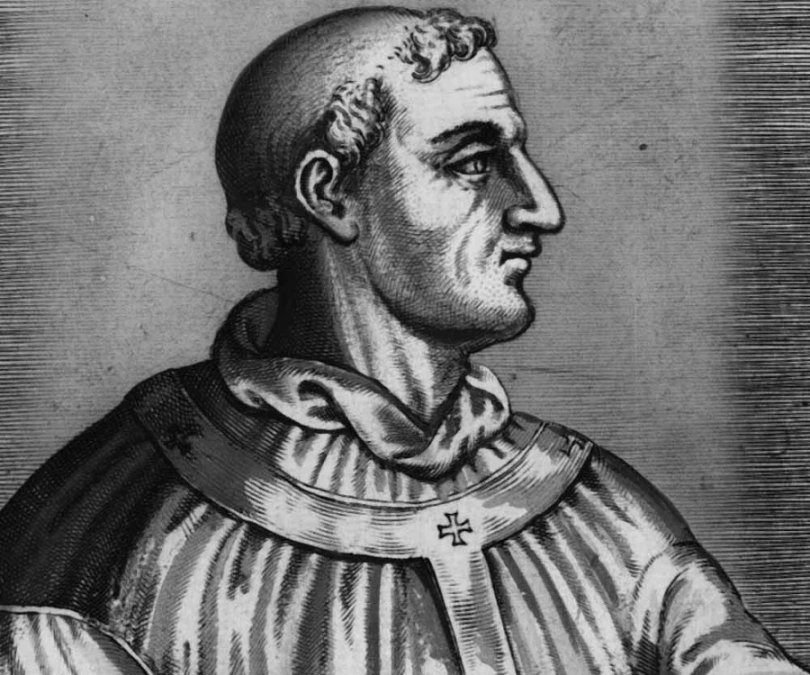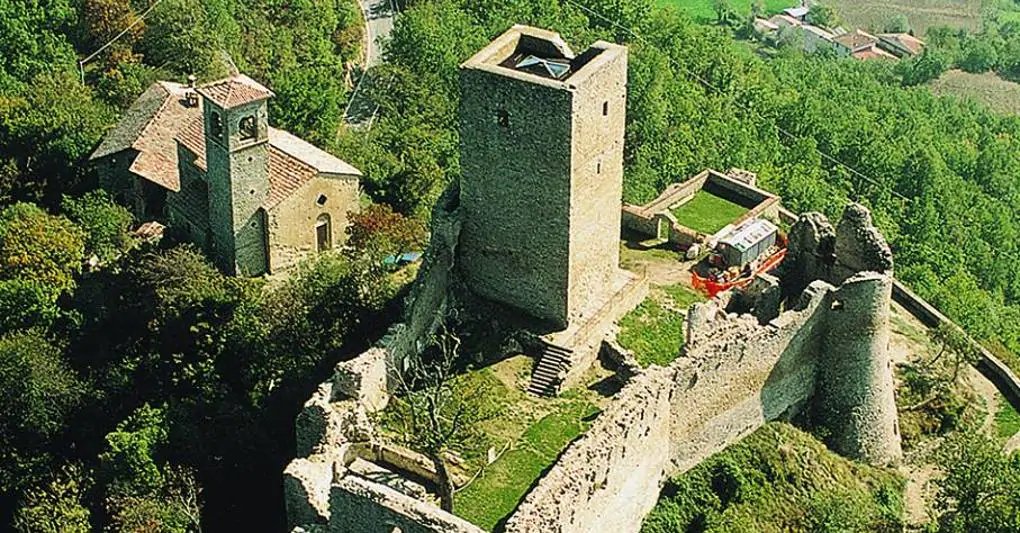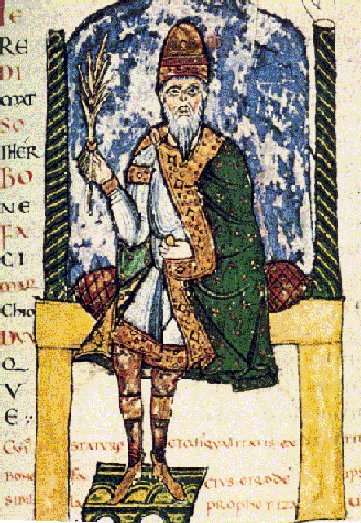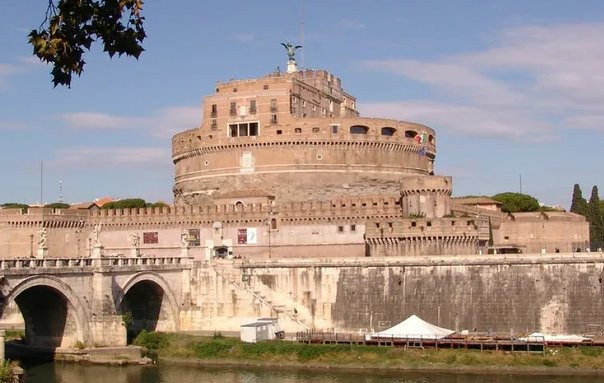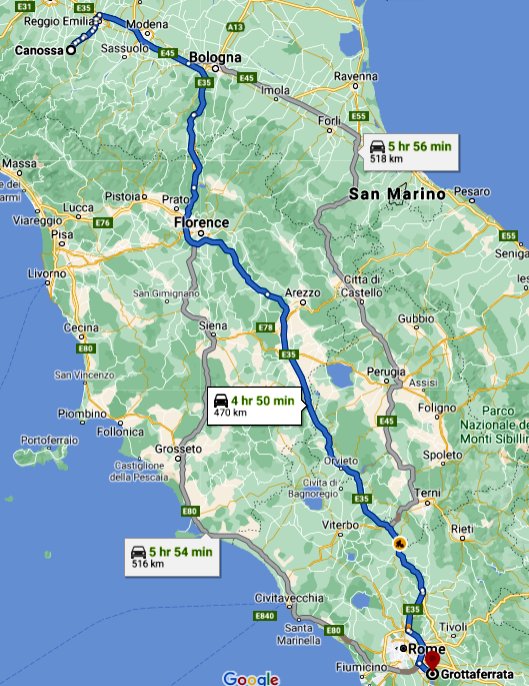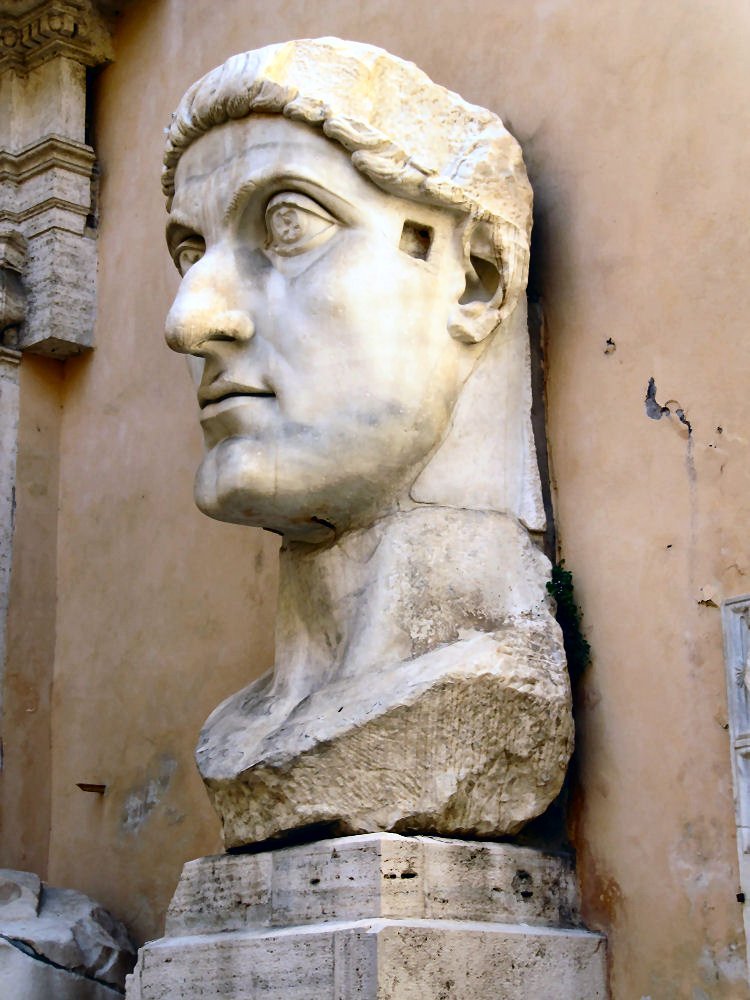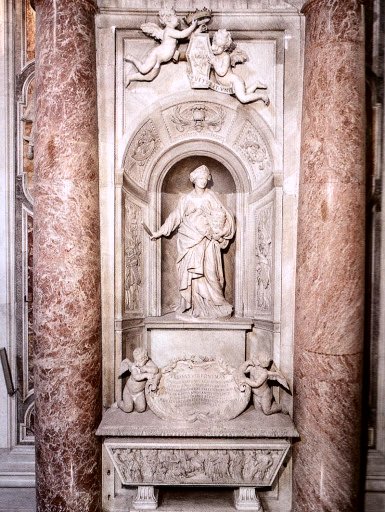I arose every morning during the week after Easter with a smile on my face. It remained until I fell asleep in the evening. Relief and joy overwhelmed many other emotions as I began the most uncertain period of my adult life. On the one hand, I eagerly anticipated the day that I finally gained full control of my destiny. Nevertheless, for the next few weeks at least, I resigned myself to the familiar role of biding my time while others managed the details.
Baroness Dubay arrived on Wednesday, and I immediately sought her company. When she visited me in Scuta I was very impressed with her appearance. She seemed a little older than at our parting in Viterbo, but time seemed to have bestowed nothing but dignity to her features. As before, her bearing was erect and noble, bordering on regal. No one would suspect that her father and all known ancestors had spent their entire lives tending sheep in the hills and meadows of Anatolia.
As soon as the baroness entered the chamber she cast herself on the floor at my feet. Our previous relationship rendered this act quite inappropriate, and I protested. However, she would not rise until she had kissed my slipper in a gesture of obeisance. Such rituals always seemed excessive. Having announced my intention to resign, I considered them totally risible.
Ingetrude expressed amazement at how the confused young man whom she last saw in Viterbo sitting on a delivery wagon cradling a pot in his lap had become the Supreme Pontiff of the Christian Church. I replied that I still identified with that kid with the pot much more than with the man wearing the tiara. She then informed me that after a week or so in Rome she planned to travel to Saxo to see if she could assist Tigra in planning for the wedding. Innumerable details there required attention, and the baroness had always shown a flair for organizing social events.
The baroness then asked for all the details of my relationship with Tigra. I happily complied. Reliving everything that I could remember brought me great joy. She was enthralled with the entire tale, but she especially loved the very beginning, in which I made a complete fool of myself, a bloody corpse of my beloved steed, and, eventually, a friend of Tigra. She also was touched by the final scene in which my poorly chosen words impelled the person about whom I cared the most to burst into tears, causing her to leave me alone and morose on Capitoline Hill.
After I described that wonderful and horrific day she declared, “Men are amazing creatures. They blunder around with no fragment of understanding of how their actions and words affect those around them. Nevertheless, in spite of such oafish behavior almost all fumble out a set of words and actions that enchant at least one woman.
“I loved listening to your story, Paul—or Your Holiness, or Benedict, or Theophylact, or whatever you currently call yourself. You have an impressive talent for narrative.”
“How you address me matters not a fig,” I replied. “Hearing your voice and seeing your lovely face again after so many years gladdens my heart beyond measure. My life seems to be exploding in many directions. I can hardly believe that all this is happening. I have surpassing confidence that you will care for Tigra in your usual expert manner and that the wedding will be sensational. I just wish that the current phase of my life would end quickly close so that I could spend more time with my beloved. How thrilling it will be to set out on this adventure together!”
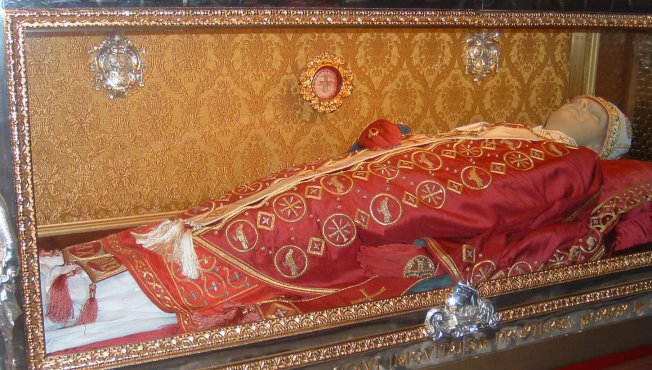
Meanwhile my brother had contacted Cardinal-Priest John Gratian and the others involved in the transition. A few days passed before negotiations commenced. I was informed that the first session would be the only one that required my presence. My brother Gregory, Cardinal-Bishop Peter, and Baron Dubay were seated near the windows. Across from them were John Gratian and two elders from the Crescentius family. The deposed pontiff from Sabina was not invited. To my shock the seventh chair was occupied by the Toad, who was perched on a cushion as thick as a fist with his feet dangling in the air beneath him. No one had warned me that the despicable little monster had slipped back into Rome. His loathsome presence did not unnerve me, but a frown certainly crossed my face.
When I entered the chamber, the Toad sprang from his chair, rushed over, and prostrated himself before me to kiss my slipper. The others followed his example with markedly less enthusiasm. The Toad then welcomed me cheerily to the meeting, and asked me whether I wished to say a few words to establish the mood of the proceedings. It seemed bizarre to me that no one else questioned the role that he had assumed. The irritating dwarf acted as if it were a foregone conclusion that he would oversee the negotiations. His lack of decorum annoyed me greatly, and my countenance probably betrayed my nonplus.
I refused to begin speaking until I had sufficiently regained sangfroid. I then announced my intention to resign from my office in order to pursue my longstanding goal of spreading the Word of the Lord in distant lands. I made no mention of Tigra. This news fell upon six somber faces. Only the Toad’s registered a reaction. A malicious grin crept out of the right side of his mouth as I added that extensive prayer and meditation had led me to conclude that my godfather, John Gratian, would make a worthy successor. This was probably the most preposterous lie that I had told since I had obfuscated the account of my pilgrimage to Jerusalem. I struggled to force words past my teeth and lips.
I will probably burn in Purgatory for this act, but because my trusted associates warned that designation of my godfather as my successor was critical to the success of the plan, I have never felt contrition. Alas, I can recall many other actions of mine that violated the Lord's commandments but promoted values that I considered overwhelmingly importance. I wonder if I will ever gain the Divine Presence.
I also emphasized that the city was still recovering from the recent bloodshed and destruction. I sincerely hoped and expected that this development would be a unique opportunity to smooth the path to peace and progress. Everyone nodded, even those most closely associated with the recent coup. I thanked them for devoting their valuable time to this important task. After leading a short prayer for the guidance of the Holy Spirit I bestowed my blessing on all and took my leave.
The negotiations dragged on for the next two weeks. Near the end of that period I received a letter from Tigra that underscored how much she had been enjoying the company of the baroness. She also wrote of her frustrating wait for our reunion. She desperately wanted to speak with me and to apologize for her behavior on the Capitoline Hill. She explained that she had been so overwhelmed with emotion that she could scarcely organize her thoughts. I read the letter five or six times when I received it and scores of times in the intervening years. Although many years have elapsed since last I laid eyes on it, I could still reproduce the text. I cannot remember yesterday’s weather, but her words were seared on my heart.
Baron Dubay eventually informed of us that nearly all the details of the transition had been finalized. I was delighted to hear that everything would be concluded in the following week. On the designated day, a Thursday,[1] the plan called for me to resign from the papacy in the morning. A synod would be called to elect John Gratian in the afternoon. Sufficient votes had been assured. His investiture ceremony would take place on Thursday evening. On Friday morning the new pontiff would release me from my priestly vows. The rest of the day would be devoted to processions and other festivities. The baron assured us that the requisite financial arrangements for my excursion to Poland were in place. Having reported this, the baron clapped me around the shoulder in an embrace that I had not felt in more than a decade. I had the impression that he was as relieved as I was.
“The negotiations were tedious and difficult, Your Holiness. That Toad was even slimier and more devious than I remembered. His attitude remains as imperious and obnoxious as ever, but he now has developed a much more impressive assortment of schemes and tricks. On a few occasions I needed to physically restrain your brother from attacking him.”
As I heard these words, I secretly wished that at least once my friend's restraint had failed, but I did not share my fantasy of my brother’s powerful blows raining on the Toad’s puny body. In retrospect it seems incredible that a creature as brash and malevolent as the Toad had, as far as I knew, thus far managed to avoid physical thrashings at the hands of his betters.
The baron continued, “In spite of all that, I judge that our solution to this problem is practicable. The result satisfies no one, myself included, but it is unlikely to upset anyone so much that they feel compelled to sabotage it. Most importantly, it preserves the integrity of the Christian Church.”
On the historic day I was required to attend many meetings and ceremonies. I concentrated on suppressing all traces of emotion from my facial expressions. My feelings were, in fact, mixed. The frustration with the length of the ceremonies was roughly balanced by the thrilling anticipation of joy and excitement in the near future. At the end I bade farewell to friends and associates who had helped me so much, and I prayed for God’s blessing on the new pontiff, Gregory VI, and all the men—even the despicable Toad—who would help him with the difficult tasks awaiting them. The baron ascertained that the pontiff had made good on his promise to release me from my vows. Then we set off together for Saxo, the baron in his carriage, and I, again known as Theophylact of Tusculum, mounted on the splendid Maltempo.
My first sight of Saxo, as on my other visits there, focused on Tigra at the castle gate awaiting our arrival. As on those earlier occasions, her first duty was to make certain that the groomsmen attended to our horses. Satisfied that these tasks were being diligently executed, she rushed over to me and leapt into my arms. I confess that I this startled me so much that I lost my balance and toppled to the ground. Tigra landed on top of me. We lay like that as everyone laughed. I would have been content to lie there until starvation or the elements forced us apart, but others felt compelled to help us up.
Tigra seized my hand and led me into the castle. She wanted to show me the impressive preparations for the wedding feast. Ingetrude had designated that it would take place in August. I could not understand the need for such a long wait, but at least I would be spending time with Tigra rather than in a bleak palace in Rome surrounded by clerics and officials. I considered myself incarcerated within the city's walls. I had no jailer, but neither could I leave at will.
I spent mornings riding with Tigra, and each was a joyful experience, even when Zeus Cloudgatherer interfered. I had hoped to devote my afternoons to consulting with the baron about the upcoming expedition to Poland. This expectation was scuttled by the immense amount of his personal attention that the transition necessitated. The Toad was acting as Pope Gregory’s legate in these matters. His every action needed to be checked closely. If not, he was liable to renege on as many particulars as he could. My old friend had successfully dealt with all manners of people from cutthroat assassins to the German emperor himself, but he professed that he had never encountered anyone as wily as the Toad. “That homunculus,” he proclaimed, “has become the greatest threat to your family's accomplishments in this century. He hatches plots daily, and each must be countered posthaste. Regrettably, an unintended effect of this project has been to provide him access to real power; Gregory VI has appointed him Papal Chaplain.”
The idea of the Toad as chaplain of anything was ludicrous. He was not a priest. He was not a monk. He was nothing more than a power-hungry runt[2] who feigned righteousness.
My hand has begun to tremble so severely that I can scarcely keep pen in contact with parchment.[3] I will try to muster the resolve to write a few sentences about the subsequent period. I can do no more than that.
The next few weeks were extraordinary, in fact rapturous. Then Tigra, who had never been ill for even a day, contracted a fearsome ailment. Feverish and nauseous, she suffered horribly for weeks. Despite our prayers and supplications to the Lord and the best possible medical attention, her soul departed her body and joined the celestial host.
I cannot provide even an approximate description of the following months because I have no memory of them. Evidently I completely lost control of my faculties in a horrible—probably disgraceful—scene. My friends and family consigned me to a castle in Canossa that belonged to the baron’s friend, Boniface, Margrave of Tuscany. [4] My lunacy persisted into the autumn. When I regained control of my senses, it happened quite suddenly. One day I asked a woman who had been caring for me whether my horse Maltempo was at hand. I added that I would like to go for a ride if possible. She was startled to hear anything more than a gurgling sound or a cry of anguish emerge from her patient's mouth, but she managed to stammer that my horse was stabled nearby.
That afternoon an old man whom I did not recognize entered my room. He told me how happy he was to see me feeling much better. He asked what I could recall of the previous few months. As tears ran down my cheeks I replied that I remembered holding Tigra’s hand as she expired. It was cold as marble, but soft as a two-day-old chick. After that I could only recall a few scenes—some rather violent—that made no sense to me. I also admitted that I had no knowledge of my whereabouts, and I recognized no one.
The old man informed me that he was the Margrave of Tuscany, and he asked me to address him as Boniface. We were in one of his family’s castles near the remote village of Canossa, far north of Rome. We had previously met at the time of Emperor Conrad's ill-fated journey to Italy. “But that was seven years ago. The last few years have not been kind to me. The stress of dealing with the imperial cohorts and the relentless problems of my own realm have sapped my energy and left the old man who stands before you. That you did not recognize me neither surprises nor offends me.”
Thus prodded, my mind could associate the stern visage of the nobleman who had successfully dealt with Emperor Conrad in that perilous period with the withered, grey, and balding man who now addressed me. I asked him why I was in his castle and how I had arrived there. He said that everyone feared that I had completely lost my mind. The baron and my brother Gregory had hoped that I might recover more quickly if I convalesced in a location with no association with Tigra. For months I lay on the bed listless and silent. Occasionally I would rise and take a few steps in no particular direction, but I never attempted to communicate. Even on the daily afternoon walks on which I was led by the hand of an attendant, I answered questions with no more than a grunt. I never looked directly at anyone. My inquiry about the whereabouts of Maltempo was the first sensible thing that I had uttered.
“By the way, your stallion is doing well. My groomsmen provide him with food, water, shelter, and exercise. They tell me that he is the most spirited animal that has ever been in their care. In fact, most are afraid to go near him.”
“May I see him?” I asked.
The margrave led me on a short walk to the stables. Once there, he immediately seated himself on a bench inside the structure. He vigorously massaged both of his knees, and while attending to them, he introduced me to a groomsman as the owner of the black stallion. The young man cheerfully escorted me to Maltempo’s stall, but he kept his distance as I spoke a few gentle words to my equine friend and tentatively approached him. Maltempo immediately sauntered over to me and submitted to my affectionate pats and rubs. Perhaps he missed me, too.
I could not help visualizing Tigra riding Maltempo through the fields at full gallop, and tears again flowed down my cheeks. I quickly regained my composure, however, and I dried my face on my sleeve.
I rushed back to speak with the margrave, who was still resting on the bench. I inquired about saddling up Maltempo and taking him out for a ride. The old man rubbed his whiskers and then suggested that I should wait until the following day. “Not much light remains. Allow me a day or so to find a suitable companion who knows the roads and paths in this area. Also, I want to make sure that your recovery is apace before you undertake vigorous activity. If you attempt too much too quickly, you might risk a setback.”
On the following afternoon I met a young man named Benedict. He began to address me as “Your Holiness.” I stopped him and told him that those days were behind me; he should call me “Theophylact,” or if that was too difficult, just “Teo.” He smiled and nodded, and after that we were Benedict and Teo. Benedict informed me that his father, who had been the margrave’s chancellor for more than a decade, had named his first-born son after my uncle as a tribute to Pope Benedict VIII’s successful campaign against the Saracens. Benedict was surprised when I told him that the pontiff’s baptismal name was also Theophylact. So, in effect, we both had been named in tribute to the same great man.
On horseback Benedict and I explored the countryside the next day and nearly every day thereafter. The next few weeks were unproductive but free of stress. I had as few responsibilities as a child, and I enjoyed it. One autumn day my reverie was interrupted by the unexpected news that my brother Gregory and his wife planned to travel to Canossa to spend Christmas with the margrave, his wife Beatrice, and their three children.[5]
Seeing my brother again brought me great joy, and the sight of Costanza was indescribably delightful. I maintained the pretense that we had not seen each other in a very long time. For me, this was not difficult because, in point of fact, it had been more than a year—and a very long year at that—since we had enjoyed a singing lesson together. I had missed her terribly at first, but I dared not ask about her. On this occasion she nodded curtly at me, and said only one sentence. “It is heartening to see that you have recovered, Theophylact.”
A hunt was scheduled for the day following their arrival. I excused myself with the explanation that recollection of my last hunt at Saxo aroused so many vivid memories that participation in another would be too painful to bear. No one challenged my decision. While my brother and the men of the castle were out in the woods chasing wild game, my resourceful sister-in-law accosted me in my chambers. When she entered, she immediately threw her hands up to her cheeks and gasped. “Heavens, look at you.”
I had paid little attention to my appearance since I had recovered my senses. I absently reached up to my face and felt my wispy beard. At some level I must have realized that it had been growing during this period, but up until that point it had not concerned me. Costanza produced a small mirror[6] and handed it to me. The face that I beheld there was barely identifiable—a wild man, a hermit, a brigand, or a lunatic. It was definitely not Pope Benedict IX; it bore only a passing resemblance to any Theophylact that I could remember.
“Please,” she begged, “at least let someone trim that hair. Promise me.”
After I did so Costanza let me know how sorry she was to learn about Tigra’s untimely passing. After I assured her that I was physically healthy but still somewhat morose, she wanted to know if my plans still included the expedition to Poland.
How can I explain my stunned reaction to this imminently reasonable query? Although the journey had been the focal point of my plans for at least a year and had been my dominant aspiration for years before that, in Canossa I had not considered traveling to Poland for even an instant. In fact, since Tigra’s death I had paid little attention to anything in my prior life. That stretch of time seemed to belonged to someone else. It was as if my mind refused to access those memories, or maybe my heart somehow intercepted them. I struggled to bring words to my lips. I eventually mumbled, “I do not know.”
She tilted her head quizzically and then nodded. “I cannot claim to understand your feelings, but maybe I can appreciate their depth. The tragedy must have devastated your spirit.”
She changed the subject. “I do bear important news.” She looked at her hands for some moments before continuing. “I have located him.”
I had absolutely no idea about whom she was talking. In vain I tried to think of anyone who had disappeared or had traveled abroad. My expression must have reflected my confusion. “Your son, Theophylact. Remember him? I finally discovered his identity and where he lives. I have actually observed him from a distance for a few short periods. He resides in a village not far from Tusculum. He resembles you a great deal, certainly more you than me. I think that they intend for him to be a priest. You must promise me that you will not try to see him. Count Alberic is dead, but in the Alban Hills his iron will survives him.”
Costanza often left me speechless. I remembered very well that my lust and ignorance had probably ruined both her life and my brother’s. I also was at some level cognizant of the fact that our sin had resulted in a child, but even before Tigra’s death I never considered that the boy would be growing older and would have a life of his own. I was like an imbecile or an infant incapable of comprehending that the parts of the world outside of his vision continued to change. “Do you know his name?” was the most intelligent reply that I could muster.
“John, I think. I told you that before, remember? I dared not ask many questions, and my time is never really my own. Even now I must leave before someone notices me here.”
She vanished before I could open my mouth to comment. Shortly thereafter I requested that someone trim my beard a little and brush my hair. I let the hair on my pate stay long.
On the morning of St. Stephen’s Day[7] my brother invited me to join him for a walk. I was somewhat taken aback by the request. Gregory seldom took leisurely strolls, and if he merely sought companionship, he would surely have asked someone else. Moreover, I could never remember him seeking my advice on anything, and, unless formally pressed to do so, he had always been reluctant to share his thoughts with anyone. He began by consoling me about Tigra’s passing. He confided that the profound effect that it had on me convinced him that my feelings for her were genuine. He apologized for his previous harsh words.
Gregory then admitted that in my absence his work in Rome had not been going well. The Crescentii had slowly but surely been amassing their forces in the city again. They had again established a virtually impenetrable stronghold in Sant’Angelo. All of the men in the defense forces who were loyal to my family had been replaced by Crescentii family members, their henchmen, or allies.
This was disheartening, but mostly to be expected. Other news was more alarming. Benedictine monks had been descending on the city in substantial numbers. Every day in every major piazza one of them declaimed about the need for change in the Church. They denounced our family’s arrogance for assuming that the papacy was the private possession of the counts of Tusculum. They accused the three popes from our family of not only tolerating an atmosphere of decadence, promiscuity, and corruption, but also of deplorable exhibitions of these sins within the sacred halls of the Holy See. In particular, they insisted that I had employed witchcraft using powers granted to me by fallen angels. They reminded people of the time that I had publicly “stolen the sun” and threatened to keep it if Christians did not bow to my wishes. The monks even spread rumors of orgiastic rituals within the Lateran and Scuta involving the pontiff, other high-ranking clerics, and prostitutes of both sexes.
Their watchword was “reform.” The monks preached that the policies and practices of the Church, and especially the hierarchy in Rome, needed to be reformed in order to dispel the diabolical influences. They argued that the primary obstacle to the spread of Christian principles had been my family, especially myself. My removal from the office of Supreme Pontiff, they proclaimed, had been an act of Divine Providence that cleared the path for the sweeping reforms needed to return the Church to its sacred apostolic purpose.
The whole campaign was, of course, preposterous. It was obviously carefully coordinated to besmirch the reputation of my family and our three pontificates. Our enemies' goal was to denigrate the importance of and to draw attention away from the important positive steps that we had taken to restore the unity[8] and authority of the Roman Church and to enforce peace, prosperity, and harmony within the Petrine Patrimony. Gregory reported that my three brothers and their agents had tried to counter the monks’ outrageous claims, but their efforts had been ineffective. People were hearing similar outlandish tales from diverse sources. Many Romans were beginning to believe the rumor that for several decades our family had somehow contrived to run a degenerate den of sorcery and iniquity in the precise center of the administration of Holy Mother Church, and no one in the city had previously noticed.
Having read Pope John XII’s diary, I realized that some of the assertions might be more credible than my brother thought. What Pope John claimed to have done on a regular basis probably exceeded the most degenerate notions that the monks could ever imagine. Perhaps for the first time in our relationship Gregory was playing the role of the naďve one, and I was worldly. As that thought passed through my mind my face must have betrayed my amusement.
“What are you smirking about? This is extremely serious, and I cannot decide how to deal with it. And I have not yet told you the worst. Our enemies have seized Scuta. The family members and the staff living there barely had time to escape to Tusculum.”
“I appreciate that the situation is grave,” I replied. “But what can I do? I can accomplish nothing from here, and from what you tell me, it would only make matters worse if I came to Rome.”
“Answer me this. If we, that is the hegumen, myself, Baron Dubay, Cardinal-Bishop Peter, and a few others, devised a workable plan for your reinstatement, would you consent to returning as Supreme Pontiff?”
I paused for several heartbeats. “I have great respect for all of you, but I do not see how I could help. If you cannot counter the military maneuvers of the Crescentii, what would it gain for me to be in Rome?”
“Put aside questions about the specifics at this point. The baron thinks that he could design a plan with a good likelihood of success if carefully executed. He has pledged to devote his time, energy, and resources to the effort, but he needs to be certain of your willingness to resume your pontificate if we provide a means to that end. No one else can play that role.”
“Why not? Almost nothing that I did as pontiff required any particular talent. My primary function was merely to listen to advice and do what others suggested.”
My brother ignored my argument. “Let me ask this,” he said. “Would you be willing to make the journey to Grottaferrata and listen to the hegumen's perspective on this subject? The baron’s plan will probably require several months to allow for all the elements to align. We therefore need to know within the next month whether we can count upon your participation when the day for action arrives. Would you return to Rome with us? If I failed to convince you to join us, the hegumen commissioned me to try to persuade you at least to travel to Rome so that he could personally explain why your participation is critical.”
Gregory grabbed me by the shoulder in a friendly manner. The situation was unlike any that I could remember. My brother's demeanor made clear that he was asking me as a brother and as the senior member of our family. At that moment I clearly saw traces of my father's image in my brother’s face. I could not turn him down. I said, “Of course I would gladly meet with the hegumen at any time and talk with him about any subject, but this is quite unexpected. I need some time to think about it. It would probably be better if I came on my own in a week or two. Would that suffice?”
“All right, but tarry no longer than that. Furthermore, you must swear upon your love for our mother, who we both know is in heaven listening to us and watching over us, that you will not forget about the commitment and thereby force me to return here, grab you by the scruff of the neck, strap you to the back of a mule, and haul your sorry carcass back to Rome.”
I smiled at that, and then we both laughed. As I think back on all of our years together, I can remember no other occasion in which Gregory and I shared a hearty laugh. Perhaps there were such incidents; the events that have faded into the shadows over the years are uncountable.
I soon learned that my new friend Benedict had long desired to make a pilgrimage to Rome. Therefore, within two weeks of talking with Gregory I departed for the city in Benedict's company. He took charge of the expedition, which included a number of his friends. I was merely a guy named Teo who professed to share his longing to visit the sacred churches and shrines of Rome. The circumstances dictated the importance of deflecting attention from me. Unfortunately, that meant that I could not bring Maltempo on the trip. It would be somewhat difficult for most people to recognize me with my new beard, longer hair, and common clothes. However, disguising Maltempo was impossible; he was more familiar to Romans than I was.
Having previously dispatched a message to Hegumen Bartholomew indicating the date of my arrival in Rome, I rode up to Grottaferrata on the morning after we had reached the city. A monk led me to the same cell in which the hegumen and I had conducted our first torturous discussion prior to my pilgrimage to Jerusalem. The cell seemed even more austere than before in that the stool and table were now much older. I suspected—correctly— that the sleeping mat was also the same. The straw may have been changed.
The hegumen started a bit when first he saw me. I bore little resemblance to the man whom he had known so well for so many years. It was not just the clothes. My hair and beard were new, and my expression must have changed as a result of the events of the previous few months. However, he made no mention of any of this. He directed me to the stool. Sitting cross-legged on the mattress almost within arm's reach, he said a short prayer asking the Lord to provide us with the ability to communicate forthrightly and the wisdom to gain insight into the Divine Purpose.

To my surprise, he then recited a jeremiad about the lack of erudition in Romans and Westerners in general. After citing several examples of deplorable ignorance that he had recently witnessed at first hand, he asked me what, in my judgment, was the most important moment in the history of the Christian Church since Peter came to Rome. I had years of experience in engaging in mental gymnastics with clever and erudite clerics, but I had never considered this question before, and I had great difficulty coming up with a defensible answer. I hesitated while I mentally replayed one thousand years of Christian history in my head. In the end I answered that it must have been when Pope Leo[9] persuaded Attila the Hun not to invade Rome.
The hegumen nodded. “That was definitely an important event for the city of Rome and its immediate environs, but I would not agree that it had much impact on the rest of Christianity. After all, Rome had already survived the sacking by the Goths[10] several decades earlier, and only a few years after Attila withdrew, the Vandals invaded the city and sacked it.[11] So, Pope Leo’s feat had an impact that was confined to a small area, as compared with the enormity of Christendom, and the benefit was short-lived.
“Even so, your answer is not a bad one, and it enforces the point that I wish to make. You are without a doubt among the most intelligent and educated men in Italy, but even you mistook Rome’s immediate interests for the long-term interests of the Church.” I must have blushed at this harsh assessment.
He continued, “Let me ask you this: how much do you think that most Romans know about Pope Leo the Great?”
I answered quickly: “I doubt that one in ten has heard of him. I learned a little about him in this monastery. Outside of Grottaferrata I remember no one speaking a single word about any pontiff who reigned before the great Pope Sylvester, much less several centuries earlier.”[12]
“And what do Romans know of Constantine?”
“Few know anything. I have heard some monks praise him for the bequest of half of his empire to the Church.”[13]
The hegumen paused and bowed his head. I could see his lips move before he resumed speaking. I could not discern whether he was praying silently for divine guidance or rehearsing the following.
“Your Holiness,” he began, and the use of my former title shocked me. “The most critical moment in Church history is not debatable. It occurred at the Council of Nicaea in 325, a synod of bishops that was called by Emperor Constantine to establish for all time one indisputable Christian system of beliefs. The pontiff at the time, the first Pope Sylvester, opted to send only a pair of delegates. From that council emerged the creed that all Christians, or at least those who have devoted any thought to the subject, cherish even unto the present. All Christians can proudly and confidently point to the document as the summary of their faith. Thereafter the Church spoke with one voice. Of course, there have been disagreements about some matters,[14] but that document has for over seven hundred years served as the basis for the Christian faith. Previously people spouted all manners of heresy, and no established basis for refutation existed. There is no question that creation of the Nicene Creed was the most important event in Church history. Do you agree?”
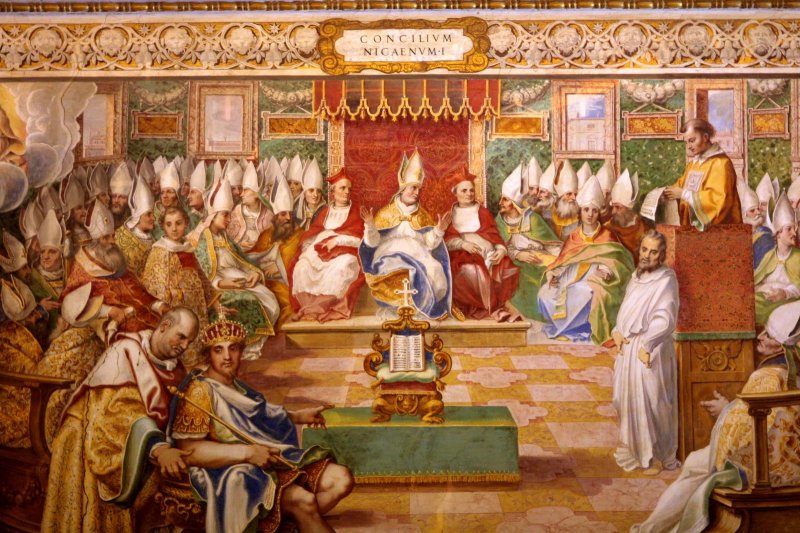
“I suppose so. I have neither thought nor prayed about it. I certainly am not prepared to dispute your claim nor defend my short-sighted answer.”
The motivation for the quiz and the history lesson escaped me until much later. Again the hegumen paused before he continued. “My argument is this. The creed is important because it unified Christian beliefs into one set. There cannot be multiple belief systems because there was only one Savior. And yet, it is possible, in fact inevitable, that Christians will disagree about details. So, someone must rule on whether interpretations are consistent with the creed. Do you agree?”
“Of course.”
“That person, by universal acclaim, is the Supreme Pontiff, the Bishop of Rome.” The hegumen then told me that he and his associates at the monastery had learned in the years following the assassination of Pope Sylvester[15] that the talents and disposition of the men who wore the pontifical tiara mattered a great deal. During those years in which the Church was so horribly mismanaged, my grandfather, the first Count Gregory, provided both property and funding for the establishment of a monastery in Grottaferrata. The abbey's first hegumen, the saintly Nilus, dedicated it to strengthening ties between Rome and the eastern patriarchates. I learned that my grandfather also pledged his family to the cause. The count also worked behind the scenes to counter the toxic influences of the Crescentii and to generate the support that his son Pope Benedict needed for his election.[16]
The hegumen then described the plan that took form due to the efforts of himself, my grandfather, and the count’s three sons. The first need was to drive the Saracens from the Italian mainland. Pope Benedict VIII coordinated his efforts with the emperor’s and those of local nobles. The result was a monumental success the impact of which went well beyond the goal of erasing Islam on the peninsula. It also restored public confidence in the pontiff’s integrity and competence. During the remainder of that first Tusculan pontificate detailed plans were devised for the longer term, including the roles assigned to my brothers and me. So, almost from birth our destinies had been determined for us.
Before continuing the hegumen assumed a strange posture in which he seemed to summon energy or inspiration from laying the tips of his fingers on his massive forehead. “I want to make one thing very clear, Your Holiness. You are an exceptional young man. I reckon that no one else could have accomplished what you have as pontiff. I have said this on many occasions. The Church now finds itself in an increasingly perilous position between the German kings and the empire.[17] Your uncles, your father, your brother, and you did well to further the interests of the one true Church. That battle is not yet won; in fact, the most difficult times probably lie ahead of us.
“Perhaps I should have shared this information with you long ago, but it seemed from my vantage point that you had accepted your role in the plan. You performed so well! I suppose that I became complacent because I had great confidence that we were all doing the Lord’s work. We have recently learned, however, that perhaps because our efforts had held the Crescentii and their allies in check for so many years, we had grown a little careless. In no way do I consider this horrendous situation your fault. Nor do I assign blame to your brother. I was your senior advisor, the sole survivor of those responsible for this divinely inspired plan. Hubris blinded me. I consider my failure a great sin.
“When I learned that a Crescentius had usurped Peter's Throne, I dispatched a message to your friend Gerard, that is, Baron Dubay. His skills were instrumental in restoring you to your rightful place. I felt a great sense of relief, but hubris blinded me again. I was insensitive to your feelings. As soon as your pontificate had resumed, we faced a new crisis resulting from the unexpected announcement of your plan to resign and wed.”
Until then the hegumen had expressed little emotion. His hands had remained folded on the tattered garment that covered his lap, and his face had seemed placid. He quickly and effortlessly switched to a kneeling position in which he sat on his heels. His brow furrowed, and for the first time he gesticulated with his hands.
“Your brother Gregory told me that you questioned why I deem it so important that you resume your pontificate. The answer, Your Holiness, lies in Rome’s position between the German barbarians and the eastern Church as personified by the emperor and the patriarch in Constantinople. The man who now claims to be pontiff, John Gratian, has already made overtures to the German king. By allying with him he presumably expects to solidify his position in Rome with the strength of German arms.
“In contrast, he has made little effort to cement relations with the patriarch and the emperor. He has sent only one letter to them, and its contents shocked Constantinople. Perhaps he was too ignorant to understand how insulting it was to them in tone and substance. Perhaps Gratian and his retinue are simply unaware how important it is for the Holy See to maintain good relations with the eastern Church. Perhaps it was a deliberate provocation. I cannot judge the intentions, but I have no doubts about the effect.”
He gazed from side to side before continuing in a much more emphatic tone. “There cannot be two Churches. This cannot be the Lord’s plan. It just cannot be. Do you understand this? Do you believe this with your heart, your mind, and your immortal soul?”
I assured him that I did.
“Of course. How could any intelligent Christian not understand this? There is only one way, and that is not to consider it at all. John Gratian has no idea of the importance of unity, and his advisers are all looking in the wrong direction.
“We must deal with the Germans. That is clear. We must mollify them as we have in the past lest they march over the mountains and destroy everything. At times we must urge them to assist when the Holy See is threatened. Good relations are important, nay, very important.
“However, at this point the focus must be on repairing relations with Constantinople. You are the only one who can do this. Do you appreciate this? The emperor and the patriarch trust you precisely because you understand them. You have demonstrated this empathy to them over the course of your long pontificate. You can read and write their language. You have been to their capital and to the other patriarchates. You understand that the Easterners are good Christians, certainly as devout as Romans. They are not heretics. Their goals and standards are in harmony with ours. They are our brothers in faith!”
The hegumen rose, placed his hands gently on either side of my face. When he tilted my head so that our gazes locked, tears began flowing down my cheeks. And so, I beg you to participate. I need to dispatch a letter to Constantinople immediately to assure them that we have a workable plan to reverse the current course and place you back on St. Peter’s Throne.
“I have no doubt that there will be great difficulties. You have already been held up to public ridicule, and that disgusting aspect will probably get worse. Nevertheless, there is no other choice at this point, at least none that I can see. I promise you that if I saw another way, I would not ask this favor of you.”
The hegumen is a persuasive man. I agreed to the plan without knowing any particulars. At least this would give my life a purpose, and I definitely believe in the importance of a unified Christian Church. Then and there I pledged my life to the cause.
[1] May 1, 1045.
[2] Hildebrand was in his mid-twenties at this time.
[3] In truth, the following paragraph was very difficult to decipher.
[4] Boniface of Canossa was the Margrave of Tuscany from 1027 until 1052. At the time of Gregory VI’s pontificate he was approximately sixty years of age.
[5] Boniface had three children with his second wife, Beatrice. The most historically important was the youngest, Matilda, who would have been an infant or a toddler at this time. After the deaths of her father, sister, and brother, she inherited all of the margrave's properties. She was a staunch supporter of Hildebrand (“the Toad”), and she was known as a great military leader. She is one of only three women entombed in St. Peter’s Basilica.
[6] Probably metallic. Glass mirrors existed in eleventh century Europe, but they were rare.
[7] December 26.
[8] Over the centuries important dogmatic differences between various segments of the Church emerged on several occasions. A few times the eastern patriarchs had been very close to declaring independence from Rome. The primary issues were the degree of deference due the popes, the acceptability of icons and sacred images, and the word “Filioque” that had been added to the version of the Nicene Creed used in the West.
[9] In 452 Pope Leo I was a member of a delegation sent to negotiate with Attila the Hun, who had come to Italy with his huge army after his defeat at the Battle of Chalons. Writers at the time credited the pontiff with Attila’s change of heart concerning an invasion of the Papal State.
[10] 410.
[11] 455.
[12] Almost certainly a reference to Pope Sylvester II, whose pontificate lasted from 999-1003.
[13] A forged document known as “The Donation of Constantine” described the emperor giving Italy and most of the western part of the empire to Pope Sylvester I in the fourth century. This document emerged in France or Spain in the eighth century. It was often used to justify the pope’s right to rule the territories enumerated therein. At this point it had never been the basis of negotiations with the Byzantine Empire.
[14] Constantine himself was baptized on his deathbed by a famous adherent of the Arian heresy. Moreover, the creed was amended by the Council of Constantinople in 381, and the western Church subsequently inserted the controversial word “Filioque”.
[15] The circumstances behind the death of Pope Sylvester II in 1003 were very suspicious.
[16] Some have written that simony—i.e., bribery—was involved.
[17] Presumably he is referring to the Byzantine Empire based in Constantinople. There was no “Holy Roman Emperor” because Henry III had not yet been crowned.

